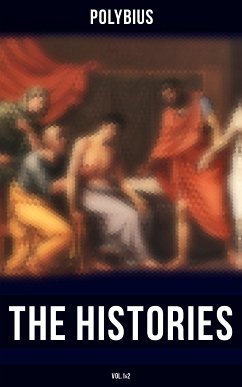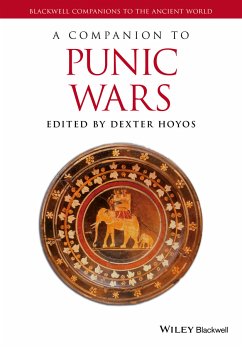
The Histories of Polybius (eBook, ePUB)
Vol. I & II
Übersetzer: Shuckburgh, Evelyn Shirley; Hultsch, Friedrich

PAYBACK Punkte
0 °P sammeln!
The Histories of Polybius presents a systematic analysis of the rise of the Roman Republic and the disintegration of the Hellenistic world. Through a meticulous blend of narrative and critical analysis, Polybius employs a straightforward, yet eloquent style, infused with a profound understanding of causality and the cyclical nature of history. His examination of Rome's military, political, and social systems is set against the backdrop of the Punic Wars, providing valuable context for understanding the broader shifts in power during the 2nd century BCE. Utilizing a distinctive approach that pr...
The Histories of Polybius presents a systematic analysis of the rise of the Roman Republic and the disintegration of the Hellenistic world. Through a meticulous blend of narrative and critical analysis, Polybius employs a straightforward, yet eloquent style, infused with a profound understanding of causality and the cyclical nature of history. His examination of Rome's military, political, and social systems is set against the backdrop of the Punic Wars, providing valuable context for understanding the broader shifts in power during the 2nd century BCE. Utilizing a distinctive approach that prioritizes firsthand accounts and factual accuracy, Polybius challenges the somewhat speculative narratives of his predecessors, thereby laying the groundwork for future historiography. Polybius, born in Megalopolis around 200 BCE, was a Greek historian who experienced the tumultuous transitions of his era firsthand. The son of a prominent politician, he was closely involved in the political machinations of the Mediterranean, which informed his perspectives on governance and military strategy. His extensive travels and firsthand experiences as a hostage in Rome allowed him to develop a nuanced view of the complex interactions between Greek and Roman cultures. For readers interested in the ancient world, The Histories of Polybius is an indispensable text that not only illuminates the rise of Rome but also serves as a comprehensive reflection on the nature of power and governance. Its themes of political realism and the interplay between fate and free will resonate throughout history, making it a critical read for anyone seeking deeper insights into the forces that shaped the ancient Mediterranean.
Dieser Download kann aus rechtlichen Gründen nur mit Rechnungsadresse in A, B, BG, CY, CZ, D, DK, EW, E, FIN, F, GR, H, IRL, I, LT, L, LR, M, NL, PL, P, R, S, SLO, SK ausgeliefert werden.













